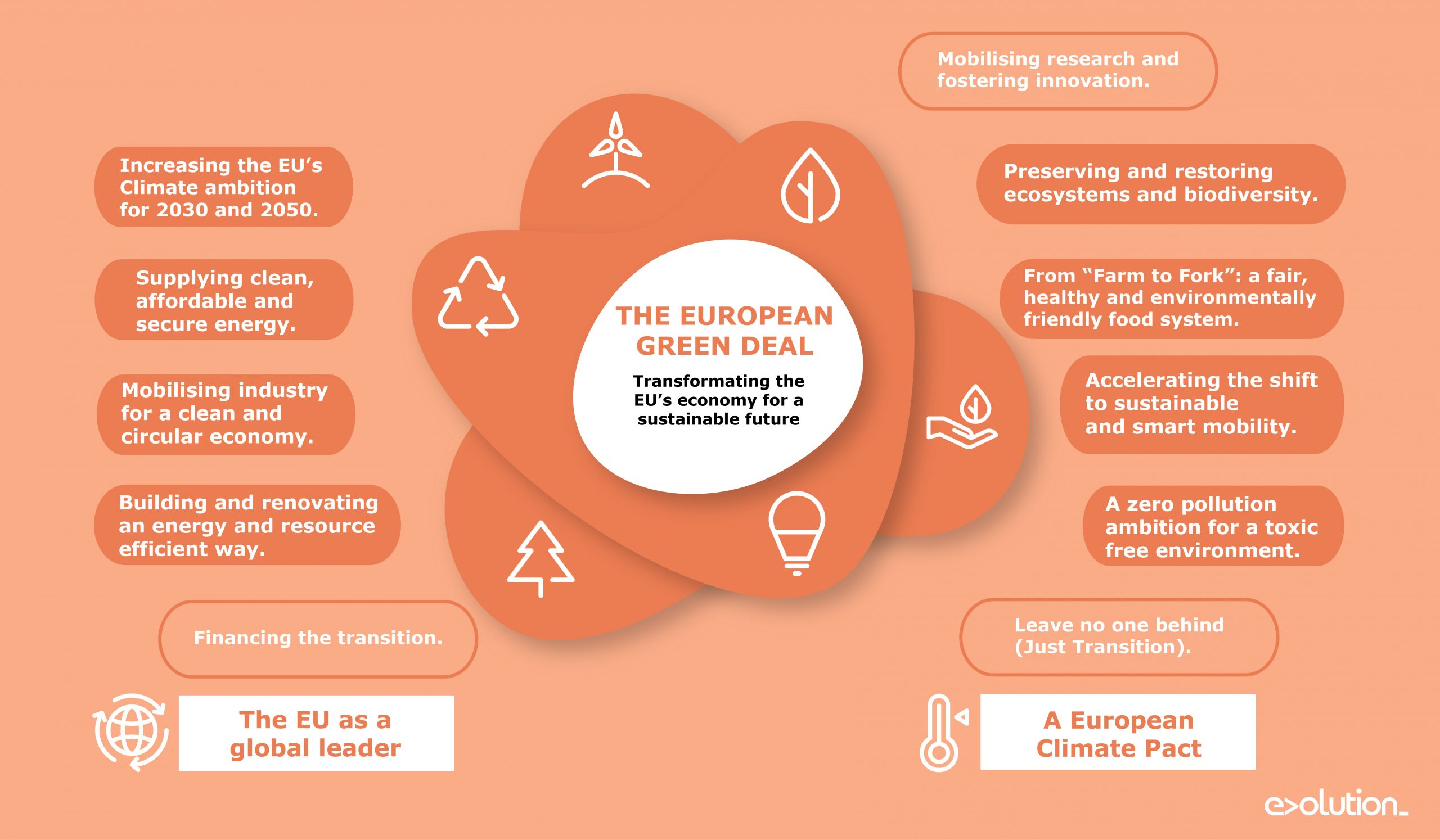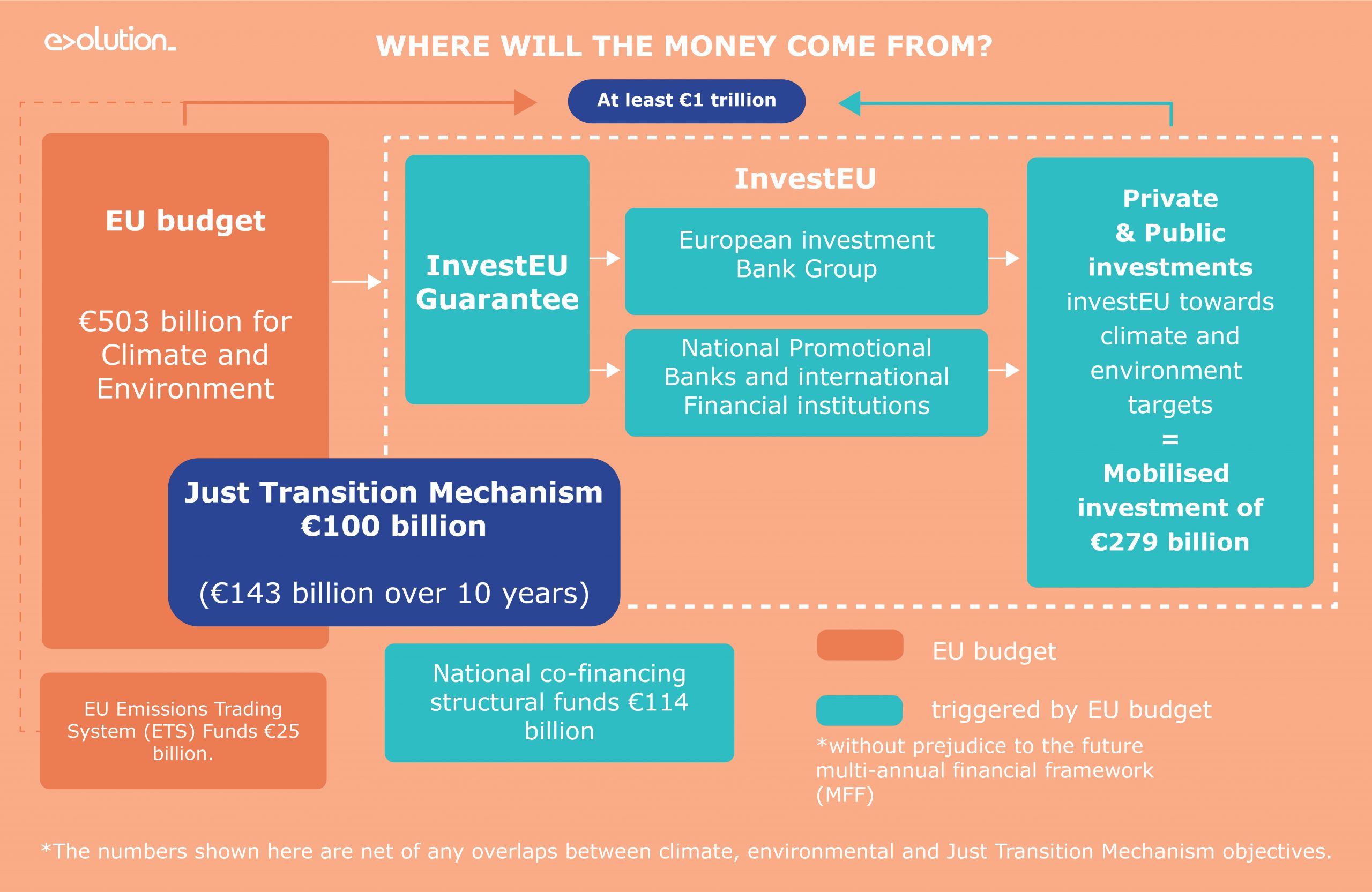The Green Deal – Challenges & opportunities

Disclaimer: This post was written a time ago, so some details may have changed since then. We advise you to check out our services page for more information or to contact us directly through this form. Thanks!
In the past weeks, the EU’s Green Deal and its implications on all levels of the EU’s funding scheme have been a topic of conversation after the announcement that all EIC Accelerator applicants submitting their projects on May 19, 2020, will need to demonstrate how their innovation contributes to the objectives set by the EU Green Deal.
Up to this day, the scope of the actions that will be carried out for the implementation of the EU Green Deal is still unclear. It is expected that the Commission will propose the first European ‘Climate Law’ by this week, taking the first of many steps that will set the path to the transition to a carbon-neutral Europe by the end of 2050.
While we are still waiting on the Horizon 2020 Work-Programme 2018-2020 to be updated, we have broken down the implications of the EU Green Deal and reflected on the new opportunities that this challenge brings for companies and individuals.
What is the Green Deal?
European Commission president Ursula von der Leyen introduced the Green Deal and its main areas of impact a few weeks ago. Among its goals, “leaving no-one behind”, and racing towards “Europe’s man on the moon moment”, which would be achieved by becoming the first climate-neutral continent.
The Green Deal is Europe’s new growth plan. It focuses on 4 main areas that set the goals for the transition: Becoming carbon-free by 2050; protecting human life, animals and plants, by cutting pollution; helping companies become world leaders in clean products and technologies, and helping to ensure a just and inclusive transition.
This transition into becoming the first carbon-neutral continent will be carried out through a set of new measures on the following areas of policymaking: Clean energy, sustainable industry, building and renovating, sustainable mobility, biodiversity, farm to fork, and eliminating pollution. These measures will involve everyone in the process, under the idea of “making sure that no one is left behind”.

Source: Communication on the Green Deal
The EU is aware of the impact that a change so big can have on people’s lives, which has led them to look into different sources of funding and investment that allow for a circular economy. They believe that the highest impact will be achieved by public financing leading the way and private actors providing the scale.
In order to maximize the impact of this agreement, the plan is to mobilize at least €1 trillion of investments over the course of 10 years, combining different sources of capital to fund sustainable projects which are relevant for implementing the Green Deal.
How are they going to implement it?
In order to achieve the ambition set by the European Green Deal, both the private and public sector have to work together. If we take into account the EC’s estimates, achieving the 2030 climate and energy goals will already require €260 billion of additional investment every year, which should remain sustainable over time. The biggest hurdle won’t only be the available funding, but its equal distribution among all countries will also pose a challenge.
What’s the EU’s answer to this problem? The implementation of a new financial tool called The Just Transition Mechanism.
The Just Transition Mechanism: Making Sure No One Is Left Behind
The Just Transition Mechanism has been put in place to ensure €100 billion investment in targeted support to regions and industries for which the transition to a greener economy will pose the biggest challenge.
This Mechanism will include, among others:
- A fund of €7.5 billion which is expected to generate at least €30-50 billion of investments.
- The InvestEU “Just Transition” scheme, which will add another €45 billion of available investment.
- A new public sector loan facility with the EIB backed by the EU budget, which will mobilize another €25-30 billion.
As part of the support plan, the EU will also promote transition plans to help to drive more investment in the beneficiary regions, which they plan to do through attractive conditions and risk-sharing strategies, both for public and private investors. Also, technical assistance will be available to advise and support, through the Just Transition Platform.

Source: Investing in a Climate-Neutral and Circular Economy
How does it affect programs like Horizon Europe?
In order to achieve the Green Deal goals, support from all financial instruments under the Horizon Europe framework will be given to research and innovation efforts focusing on the 4 ‘Green Deal Missions’. These 4 areas focus on adaptation to climate change, oceans, cities, and soil, which affect all citizens and institutions of the EU.
As well as other EU programs, Horizon Europe will play a key role in leveraging national public and private investments. The full range of instruments available under the Horizon Europe program will support the research and innovation efforts of companies contributing to the Green Deal through their innovative projects.
As well as devoting 35% of the budget of Horizon Europe to the funding of new solutions for climate-related issues, the European Innovation Council will participate in the Green Deal implementation through equity investment and business acceleration services. Their end goal is to maximize the innovative SMEs’ chances of success and to promote the rapid scaling up of companies at a global level. It is also expected that the Horizon Europe program will promote the involvement of local communities, making them work together for a more sustainable Europe.
As we previously mentioned, in relation to the EIC Accelerator, the European Commission has announced that all projects submitted to the May 2020 call will have to demonstrate how their project relates to the Green Deal goals. It is expected that by the end of March 2020, the Horizon 2020 Work-Program 2018-2020 will be updated with further details on the impact of these new measures.
How can I benefit from this transition?
The Green Deal, through the Just Transition Mechanism, offers such a wide range of coverage that is intended to protect the most affected member states and regions as well as companies and citizens.
When we are talking about the impact that the implementation of these policies will have, we need to take into account that the end goal is to become carbon-neutral by 2050. Because of this, carbon-intensive industries and sectors will be the most affected by these measures.
The European Union wants to ensure that member states and regions will be given support to ease the transition to low-carbon technologies. As well as financial support, public institutions will receive support in promoting digitization, improving transport networks and sustainable energy infrastructure, and will be helped in the creation of attractive conditions for public and private investors, providing easier access to loans and financial support.
All the positive impact that these measures will have on the member states and associates, will become part of the benefits that companies will perceive, thanks to the development of their market. The EU is ready to boost this impact by promoting the creation of attractive conditions for investors, providing easier access to loans and financial support by investing in the creation of new firms, SMEs and start-ups as well as in research and innovation activities.
When it comes to citizens, the focus will be put on promoting the creation of job opportunities in the sectors resulting from the transition, as well as the protection of those people at a higher risk of falling into energy poverty.
It is clear that achieving the goals set by the Green Deal will be challenging and complicated, but also full of opportunities for everyone. It will require plenty of experimentation and unconventional approaches that will involve all kinds of people working across industries and disciplines.
Even though we still don’t have all the information related to the EU’s research and innovation agenda for the Green Deal, we can ensure that companies with projects related to this new EU growth plan and its goals, will see a positive impact in their funding chances.
Is your company the next green unicorn? Are you looking for funding? If it sounds like you, send us a message to info@evolutioneurope.eu and get a no-cost, no-obligation evaluation for your project!

